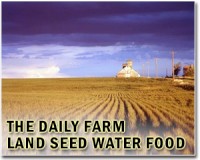 |
New York (AFP) Jan 12, 2011 World agriculture employs more than one billion people but is in trouble because it's the biggest consumer of ever scarcer water and a huge producer of greenhouse gas emissions, a new report said Wednesday. Worldwatch Institute, a research group on climate, energy, agriculture and the green economy, said there had to be a revolution in investment in food and water to reverse a "frightening" long-term depletion of stocks. "Agriculture as we know it today is in trouble," said the institute's "State of the World 2011" report. The industry accounts for one trillion dollars of the global economy but also 70 percent of water withdrawals and 15 percent of greenhouse gas emissions, much of that from developing countries. The institute said small farmers who dominate the industry would be the key to maintaining food supplies for the world's estimated one billion hungry people. Studies have shown that increasing food production is not making a dent in reducing hunger in the world. "From 1980 to 2009, the production of barley, corn, millet, oats, rice, rye, sorghum and wheat increased by nearly 55 percent," said the report. But at the same time "hunger also increased and countries' food self-sufficiency declined in that same period." Developing countries need investment to make them less dependent on food imports and international markets. They should put more emphasis on small scale and less intensive farming, the report said. "The remarkable news is that after years of neglect, governments are reinvesting in agriculture and giving priority to small-scale producers," said the report. "They are recognizing the important role of women, infrastructure, safety nets, and local markets," it added. "All this holds great potential for eradicating hunger." Worldwatch Institute warned that with nearly seven billion people now in the world, and an increase of up to 40 percent expected by 2050, governments still need to take urgent action. "This additional population, and further economic growth, will add up to sharply higher global demand for food, feed, and fiber and to higher meat consumption," said the report.
Share This Article With Planet Earth
Related Links Farming Today - Suppliers and Technology
 Germans go organic in dioxin scare
Germans go organic in dioxin scareBerlin (AFP) Jan 12, 2011 At the popular Bio Company store in Berlin's Kreuzberg district, the shelves are virtually bare, as demand for organic meat and eggs spikes amid a dioxin crisis that has shaken Germans' faith in food. "Dioxin: Bio products are not affected," screams a notice in capital letters by the empty meat shelves, the firm differentiating its food from mass-produced goods at the heart of a scandal that ... read more |
|
| The content herein, unless otherwise known to be public domain, are Copyright 1995-2010 - SpaceDaily. AFP and UPI Wire Stories are copyright Agence France-Presse and United Press International. ESA Portal Reports are copyright European Space Agency. All NASA sourced material is public domain. Additional copyrights may apply in whole or part to other bona fide parties. Advertising does not imply endorsement,agreement or approval of any opinions, statements or information provided by SpaceDaily on any Web page published or hosted by SpaceDaily. Privacy Statement |